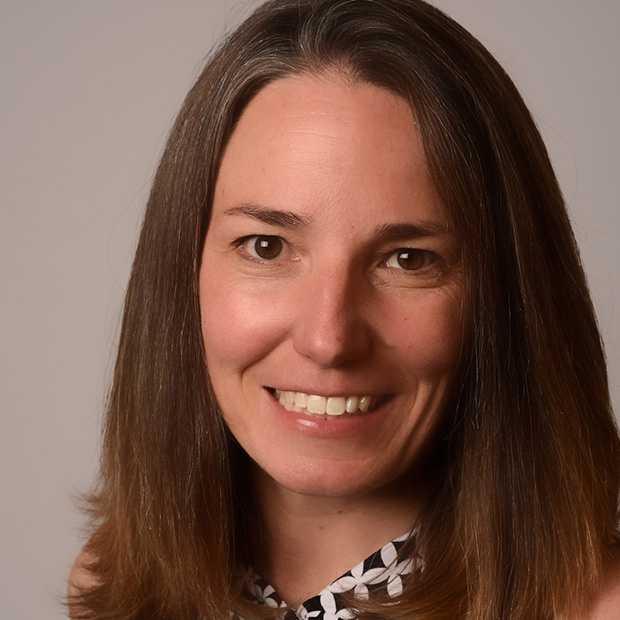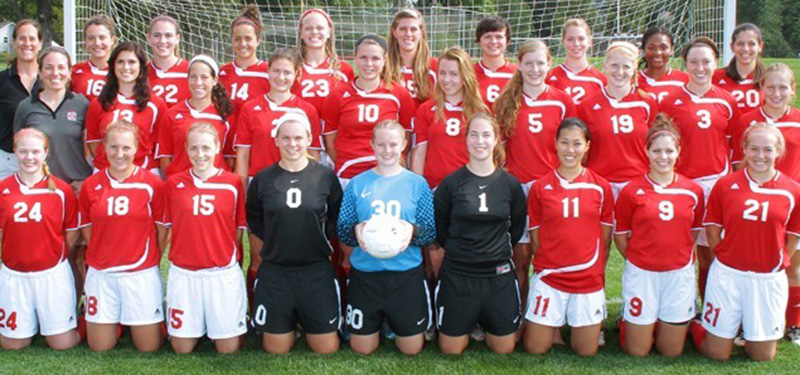Stepping up to the plate
August 19, 2021 — Heather Benning ’96 never thought she would be part of conversations that decided the fate of the NCAA basketball tournament and other collegiate sports championships.
A volunteering journey that started when she was soccer coach at Grinnell College 18 years prior, Benning was part of the team that guided the country’s largest collegiate amateur sports organization through the pandemic. A member of the NCAA Board of Governors and chair of the Division III Management Council, Benning helped tackle sport cancelations; return to competition; student-athlete eligibility; name, image and likeness; and a bevy of other substantial issues.
It was exhilarating and exhausting.
 Heather Benning ’96
Heather Benning ’96
“It was an excellent professional opportunity to be at the table during a crisis,” Benning says. “Anytime you are part of the highest levels of an organization, it’s interesting and you are learning new things. The Board of Governors usually meets four times a year but because of the crisis, we met monthly. I got to hear how the pandemic was affecting different institutions and conferences and take part in unprecedented discussion about how to move forward with college sports during a global pandemic.”
Benning has served as executive director of the Midwest Conference since March 2014. She oversees the administration of 18 varsity sports and is the conference’s chief administrator on financial, compliance, and operational matters. Midwest Conference institutions include Beloit, Cornell, Grinnell, Illinois College, Knox, Lake Forest, Lawrence, Monmouth, and Ripon. The conference office is in Grinnell.
“My volunteer roles with the NCAA helped me feel really grounded when I would have conversations in the Midwest Conference about what we were going to do as a league,” Benning says. “I had a lot of confidence that I was hearing in real time from the NCAA what their recommendations were going to be about safely returning to competition.”
Benning was a student-athlete herself at two Midwest Conference schools in the 1990s. She played soccer for three seasons at Cornell College before transferring to Grinnell. She played for one season at Grinnell and then with her eligibility exhausted, Benning served as a volunteer assistant soccer coach while finishing her degree.
“As a student, I wanted to become a math or history teacher and coach high school sports,” she says. “Being an assistant coach was my entry, but it turned out I enjoy coaching at the college level more than high school.”
After earning a master’s degree at the University of Iowa, Benning got the job as Grinnell’s head women’s soccer head coach in 1998. She went on to guide the Pioneers to five conference championships and took her team to the NCAA Tournament four times. She also has served as Grinnell’s assistant athletic director, interim track coach, an associate professor of physical education, the senior women’s administrator, and Title IX coordinator.
 The 2013 women’s soccer team was the final Grinnell squad coached by Heather Benning. She compiled a record of 167-100-16 in 16 seasons guiding the Pioneers.
The 2013 women’s soccer team was the final Grinnell squad coached by Heather Benning. She compiled a record of 167-100-16 in 16 seasons guiding the Pioneers.
Early in her Grinnell coaching tenure, Benning volunteered for the NCAA Division III Soccer Regional Advisory Committee. The committee got together on a weekly basis to look at data of how schools in the region were performing and then assembled rankings. Benning served for four years, including a stint as chair, and then a colleague suggested she volunteer for the National Committee.
“Serving on the national committee solidified for me that the NCAA is a member organization, and it doesn’t function without professional volunteering,” she says. “Contrary to popular belief, there aren’t dozens of people in Indianapolis [at the NCAA headquarters] working on behalf of Division III. The staff for Division III is less than a half dozen individuals. It’s the membership who give up their time that keeps us moving forward with the help of the NCAA staff.”
Benning went on to serve on several other NCAA groups including chairing the DIII Membership Committee from 2013-2017. In 2017, she was appointed to the Division III Management Council, which is comprised of 18 CEO’s, faculty athletics representatives, athletic directors, senior woman administrators, conference representatives, and student-athletes. She served as chair of the committee in 2020-21. As such, she also sat on the DIII President’s Council and the NCAA Board of Governors, as well as a half dozen other committees within the Association.
In recent years, the NCAA has not been highly regarded in mainstream sports media. Social media also more regularly offers criticism than praise. This can be frustrating to Benning because of some prevalent misunderstandings.
“I take the opportunity whenever I can to try to better inform the general population about the way the NCAA functions,” Benning says, noting she has an elevator speech about the organizational structure.
While NCAA president Mark Emmert is often front and center when decisions are made, his position is akin to Benning being the spokesperson of the Midwest Conference, which is governed by college presidents.
“When I put out a quote in a press release, it’s what the MWC membership or Presidents’ Council has decided. It’s not necessarily what Heather thinks the Midwest Conference should be doing even though the quote is attributed to me,” she says. “Likewise, there’s a lack of understanding or appreciation that the NCAA is a membership driven organization, and that the members are the ones to develop the legislation and bylaws under which we function. More than anything, having worked with the NCAA on committees for close to 20 years, I feel like defending and protecting those professionals that work to support us and what we do on the committees. They are getting blamed for things that they have no power to effect.”
Benning’s term on the Management Council expired in January so she’s not part of a NCAA committee for the first time since 2002. Nonetheless, she’s already contemplating what future athletic engagements are next for her.
“Some people are committee people and others loathe the work,” she says. “I think I am good fit for committee work. I’ve also been fortunate that Grinnell College and the Midwest Conference see value in my being on NCAA committees. That’s not true for everyone. They see the return of investment it provides.”
— by Jeremy Shapiro